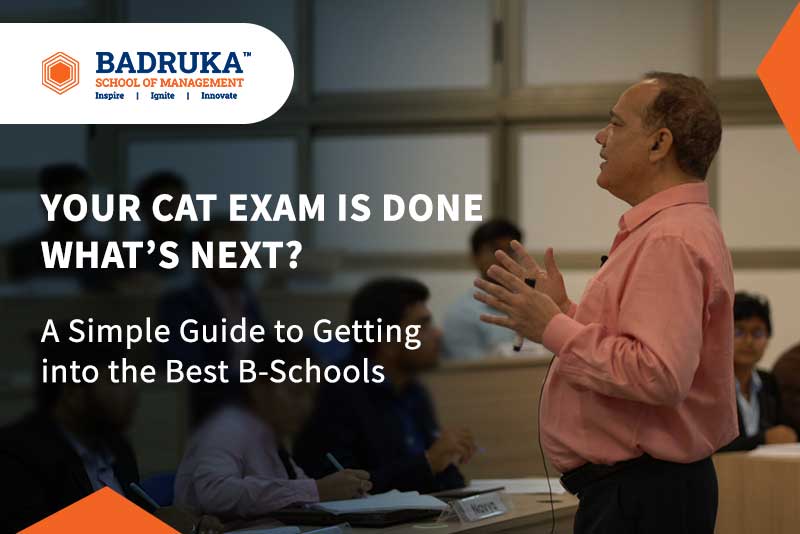Congrats! You’ve finished the CAT exam. That’s a big deal. After all that hard work, it must feel great to be done. You might be feeling relieved and excited, but also a little unsure about what to do now.
Don’t worry! We are here to help you out. Whether you want to know how to choose the right B-schools, get ready for interviews, or boost your profile, let’s figure it out together. Here’s a quick guide to help you land a spot at your dream B-school.
What Your Results Mean for Getting Into B-School
You took the CAT exam. Awesome! Now, let’s break down what your results mean for your B-school plans. Schools don’t just look at your CAT score. They look at your percentile too. This shows how you did compared to others. For example, if you are in the 90th percentile, you scored better than 90% of the people who took the test.
Remember, each school has different score cutoffs. Top schools often want scores over 95%. They also check your entire application, including your grades, work experience, and extracurricular activities.
So, your CAT score is important, but it’s just one piece of the puzzle. Show all of your strengths to really shine.
What Happens Next? Timelines!
After the exam, be ready to wait. CAT results usually come out by early January, so keep an eye on that! Around the same time, B-schools will share their application requirements. It’s really important to track those deadlines. Some top schools might start taking applications as early as January or February, while others may be a bit later.
Your percentile matters, but it’s not the only thing. Now it’s time to build a strong profile and get ready for interviews and group discussions.
Ready for the next step? Let’s talk about how to choose the best B-schools for you!
Shortlisting B-Schools
Now that the CAT is behind you, it’s time to pick the B-schools you want to apply to. This might seem overwhelming, but we’ll make it easy!
Here are some things to consider:
- Reputation and Rankings
Rankings can help guide your choices. Top schools usually have a good reputation for learning.
- Programs Offered
What are you interested in studying? If you want finance, marketing, or data analytics, check which schools offer those programs.
- Placement Records
Check how well schools place students after graduation. A school with good placement results can help you find a solid job.
- Location and Facilities
Where the school is located can help with networking and internships. Cities like Mumbai and Delhi tend to have more job opportunities. Also, look into campus life and facilities.
Preparing for the Next Steps: GD, PI, WAT
The Group Discussion (GD), Personal Interview (PI), and Written Ability Test (WAT) rounds are pivotal components of the MBA admission process for IIMs and other leading business schools. After the announcement of entrance exam results like CAT or XAT, shortlisted candidates face these rounds as part of the Personal Assessment stage. With a typical ratio of 10 candidates per available seat, competition is intense, making preparation the key to success.
1. Personal Interview (PI)
What is a Personal Interview?
A Personal Interview is conducted to evaluate your verbal communication skills, presence of mind, and ability to present your views convincingly. For MBA admissions, the PI carries significant weightage, often ranging between 30% to 50% of the final selection criteria. Conducted after shortlisting based on written exam scores, it tests candidates on academics, work experience, general awareness, and personal traits. Top B-schools, including IIMs, XLRI, FMS, and MDI, include the PI as a mandatory component of their selection process.
How to Prepare for Personal Interviews
To excel in the PI round, focus on the following areas:
- Statement of Purpose (SoP): Prepare answers related to your SoP as panellists may derive questions from it.
- Current Affairs: Stay updated by regularly reading newspapers, watching news channels, and forming opinions on national and global events.
- Academic Knowledge: Review your academic fundamentals, especially in your specialization domain.
- Work Experience: Be ready to discuss your professional role, achievements, and contributions in depth.
- Personal Insights: Reflect on your strengths, weaknesses, interests, and hobbies, and prepare to articulate them effectively.
- Hometown Knowledge: Understand the history, culture, and notable features of your native place.
- General Knowledge: Brush up on business, social, and local issues. Prepare to answer questions with a balanced, positive perspective.
Common PI Questions
- Why MBA?
- Tell us about yourself.
- Questions related to your academic background.
- Work experience and your role in previous organisations.
- Why this B-school?
- Your opinion on current events and policies.
- Specific questions about your interests or extracurricular activities.
2. Group Discussions (GD)
What is a Group Discussion?
A Group Discussion is designed to evaluate group communication skills, leadership qualities, and thought processes. Participants discuss a given topic, aiming to express their views while respecting others’ opinions. The GD carries substantial weightage in final selection rounds.
Evaluation Criteria for GD
- Knowledge of the Topic: Displaying in-depth understanding.
- Clarity of Thought: Articulating ideas logically.
- Teamwork: Demonstrating effective collaboration and respect for peers.
- Leadership Skills: Steering the discussion constructively.
- Listening Skills: Paying attention to others and incorporating their views.
Types of GD Topics
- Business & Economy: Trends, policies, and global impact.
- Current Affairs: Political developments, policy changes, and global events.
- Social Issues: Gender sensitivity, ethics, and environmental concerns.
- Abstract Topics: Open-ended themes requiring creative and critical thinking.
How to Prepare for GD
- Stay Informed: Read diverse topics in newspapers, magazines, and online platforms.
- Practice Active Listening: Engage in discussions with peers to improve listening and articulation.
- Use Facts and Figures: Back your arguments with credible data for added impact.
- Enhance Communication: Develop a clear and concise style of expression.
3. Written Ability Test (WAT)
What is WAT?
The WAT assesses your ability to structure thoughts and present ideas coherently in written form. Candidates are given a topic and a limited time to write a concise essay or analysis.
How to Prepare for WAT
- Practice Writing: Regularly write essays on varied topics to improve speed and clarity.
- Expand Knowledge: Read extensively on current affairs, business issues, and social concerns.
- Structure Your Essay: Follow a logical flow—introduction, main body, and conclusion.
- Time Management: Practice writing within stipulated time limits to simulate exam conditions.
General Tips for GD PI WAT Preparation
- Start Early: Begin preparation alongside your CAT/XAT studies.
- Mock Sessions: Participate in mock GDs and PIs to gain confidence and receive feedback.
- Seek Guidance: Consult mentors, alumni, and experts for insights and strategies.
- Stay Positive: Maintain a balanced approach, especially when discussing contentious issues.
By dedicating time to preparation and practicing consistently, you can ace the GD, PI, and WAT rounds, securing admission to your dream MBA programme. Start preparing today and take one step closer to achieving your goals.
Enhancing Your Profile
You’ve done the CAT, but there’s more to do. To boost your chances of getting into a top B-school, focus on improving your profile. B-schools want to know what makes you special!
- Build a Strong Resume
Highlight your achievements, skills, and experiences. Include academic successes, leadership roles, and internships.
- Get Short-Term Certifications
Consider short courses in fields like data analytics or finance. These can make your resume stand out.
- Extracurricular Activities
Don’t forget about your extracurriculars! Being active in clubs, volunteering, or playing sports shows that you’re a well-rounded person. Remember, after the CAT exam, it’s all about showing B-schools the qualities they value.
Exploring Other Paths
What if your CAT score doesn’t match your expectations? Don’t worry, there are several alternative routes that can lead you to a successful management career. Whether you’re looking for an accelerated program, a specialized track, or a school that doesn’t require CAT scores, the options are plentiful.
Non-CAT Programs
Non-CAT programs are management courses that do not require you to take the Common Admission Test (CAT). These programs may use other entrance exams or evaluate applicants based on additional criteria, such as academic performance, work experience, or direct application.
MBA Opportunities with Alternative Entrance Exams
Here are some popular entrance exams that open doors to top B-schools in India, apart from CAT:
1. XAT (Xavier Aptitude Test)
XAT is a gateway for top Indian schools like Badruka School of Management, and more. Here the some details about the exam you must know:
- Sections: Verbal Ability, Decision Making, Quantitative Ability, Data Interpretation, Logical Reasoning, and General Knowledge.
- Duration: 3 hours.
- Eligibility: Bachelor’s degree or equivalent.
- Application: Available on the official XAT website (xatonline.in).
2. NMAT (NMIMS Management Aptitude Test)
This exam is specifically for NMIMS and its partner universities. Here’s what you need to know about the exam:
- Sections: Language Skills, Quantitative Skills, and Logical Reasoning.
- Duration: 120 minutes.
- Eligibility: Bachelor’s degree in any discipline with a minimum score set by the respective universities.
- Application: Check the official NMAT website (nmat.org.in) for details on registration and testing dates.
3. SNAP (Symbiosis National Aptitude Test)
SNAP is required for admission to Symbiosis International University and its associated institutes. Below are some important details about the exam:
- Sections: General English, Analytical & Logical Reasoning, Quantitative Ability.
- Duration: 60 minutes.
- Eligibility: Graduate from a recognized university with at least 50% marks.
- Application: Visit the official SNAP website (snaptest.org).
4. MAT (Management Aptitude Test)
MAT is accepted by many Tier 2 and Tier 3 B-schools across India including Badruka School of Management. Check out these essential details about the exam:
- Sections: Language Comprehension, Mathematical Skills, Data Analysis & Sufficiency, Intelligence & Critical Reasoning, and Indian & Global Environment.
- Duration: 150 minutes.
- Eligibility: Graduation in any discipline from a recognized university.
- Application: For more details, visit the official MAT website (aima.in).
5. CMAT (Common Management Admission Test)
CMAT is conducted by the National Testing Agency for AICTE-approved institutions. Here’s everything you need to understand about the exam:
- Sections: Quantitative Techniques & Data Interpretation, Logical Reasoning, Language Comprehension, and General Awareness.
- Duration: 180 minutes.
- Eligibility: Bachelor’s degree in any discipline.
- Application: Visit the official CMAT website (cmat.nta.nic.in).
6. GMAT (Graduate Management Admission Test)
GMAT is ideal for international MBA programs. Let’s take a look at the important aspects of the exam:
- Sections: Analytical Writing Assessment, Integrated Reasoning, Quantitative Reasoning, and Verbal Reasoning.
- Duration: 3.5 hours.
- Eligibility: A bachelor’s degree from any accredited institution.
- Application: The official GMAT website (mba.com) provides details on how to apply and test locations.
As you read about the alternative entrance exams for your MBA, choosing the right institution becomes just as important. Among the various options available, Badruka School of Management stands out as an excellent choice for those looking to pursue a non-CAT program.
Why Choose Badruka School of Management?
Badruka School of Management offers a highly regarded PGDM program for those looking for alternatives to CAT-based admissions. Known for its AICTE-accredited curriculum, Badruka’s program blends solid academic fundamentals with hands-on learning. The specializations available at Badruka, such as data analytics, digital technologies, and entrepreneurship, provide students with the skills required to thrive in today’s evolving business landscape. The institution’s strong industry connections, combined with practical learning experiences through internships and live projects, make it an excellent choice for those pursuing non-CAT management programs.
Conclusion: Your Journey to a Top B-School Begins Today!
With the right approach, a solid strategy, and a well-prepared profile, you can confidently take on the next steps, from shortlisting schools to acing the GD, PI, and WAT rounds. Keep your options open and consider institutions like Badruka School of Management, known for its AICTE-accredited PGDM programme and hands-on learning approach. Whatever path you choose, stay focused and persistent. The MBA journey is about continuous growth and learning, and with the right mindset, you’ll soon be on your way to achieving your goals and securing a bright future. Good luck.
Reference links:




